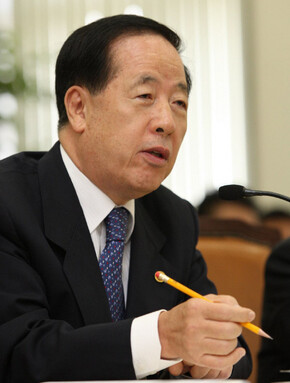hankyoreh
Links to other country sites 다른 나라 사이트 링크
Justice Minister sends a stern warning against parliamentary violence

Justice Minister Kim Kyung-han said yesterday that he will take “stern” action over violence taking place in the National Assembly, causing diverse responses from the political community.
The ruling Grand National Party officially welcomed his remarks, calling them “timely” and “appropriate.” GNP spokesman Yoon Sang-hyun said, “Even though the legislature, judiciary and administration are three separate bodies, the parliament cannot be an extraterritorial area, even for violence.”
Some GNP lawmakers, however, viewed Kim’s remarks as “excessive,” ignoring the extraordinary nature of the parliament. “It is excessive to say that lawmakers should be dealt with in the same way as ordinary criminal suspects,” said a GNP lawmaker who is a member of the National Assembly’s legislation and judiciary committee. “I also doubt whether it will really be possible for him to act on his remarks when there are existing laws and guidelines for handling legal issues involving lawmakers.”
The main opposition Democratic Party also expressed concerns about Kim’s remarks but do not seem to be taking them to heart, given that he has made similar remarks in the past. DP spokesperson Noh Young-min said, “We cannot agree with the idea of bringing every problem to the courts when the ruling and opposition parties should be talking about things that happened when normal communication was impossible. I suspect that the remarks might be the result of an excessive amount of loyalty to the president.”
Another DP lawmaker echoed that opinion, saying that Kim’s remarks must have stemmed from his unconscious calculations about what the president might be thinking. He added, “I think the minister made the remarks without knowing that there is a parliamentary law under which the Assembly speaker deploys its own guards to restore order and police officers are dispatched only at the speaker’s request.”
This is not the first time Kim has incited controversy with his remarks. During his report to President Lee Myung-bak on Dec. 29, Kim emphasized the government’s policy of zero-tolerance on illegalities as a way of ensuring law and order. When the police came under fire for a deadly crackdown on people protesting a redevelopment project in Yongsan in January, Kim drew criticism from opposition lawmakers when he said that people who committed acts of violence against police officers who were carrying out their duties was a challenge to the authorities.
Prosecutors are also not giving Kim’s remarks much weight, saying that he was just underlining the principle of law and order. Han Moo-kun, a prosecutor who is part of the team investigating the incidents in the National Assembly said, “There were no guidelines (for the investigation) from the Justice Ministry or the Supreme Prosecutor’s Office. We’ve been conducting the investigation in accordance with law and order, and (the minister’s remarks) should be understood as a re-statement of those principles.”
Another senior prosecutor said, “Even if the prosecution seeks an arrest warrants for a National Assembly investigation, the court makes the final decision on whether warrants are issued. The minister’s remarks should be interpreted to mean that those who commit crimes should be punished.”
Please direct questions or comments to [englishhani@hani.co.kr]
Editorial・opinion
![[Column] Life on our Trisolaris [Column] Life on our Trisolaris](https://flexible.img.hani.co.kr/flexible/normal/500/300/imgdb/original/2024/0505/4817148682278544.jpg) [Column] Life on our Trisolaris
[Column] Life on our Trisolaris![[Editorial] Penalties for airing allegations against Korea’s first lady endanger free press [Editorial] Penalties for airing allegations against Korea’s first lady endanger free press](https://flexible.img.hani.co.kr/flexible/normal/500/300/imgdb/original/2024/0502/1817146398095106.jpg) [Editorial] Penalties for airing allegations against Korea’s first lady endanger free press
[Editorial] Penalties for airing allegations against Korea’s first lady endanger free press- [Editorial] Yoon must halt procurement of SM-3 interceptor missiles
- [Guest essay] Maybe Korea’s rapid population decline is an opportunity, not a crisis
- [Column] Can Yoon steer diplomacy with Russia, China back on track?
- [Column] Season 2 of special prosecutor probe may be coming to Korea soon
- [Column] Park Geun-hye déjà vu in Yoon Suk-yeol
- [Editorial] New weight of N. Korea’s nuclear threats makes dialogue all the more urgent
- [Guest essay] The real reason Korea’s new right wants to dub Rhee a founding father
- [Column] ‘Choson’: Is it time we start referring to N. Korea in its own terms?
Most viewed articles
- 160% of young Koreans see no need to have kids after marriage
- 2[Column] Life on our Trisolaris
- 3[Reporter’s notebook] In Min’s world, she’s the artist — and NewJeans is her art
- 4Hybe-Ador dispute shines light on pervasive issues behind K-pop’s tidy facade
- 5[Editorial] Penalties for airing allegations against Korea’s first lady endanger free press
- 6Presidential office warns of veto in response to opposition passing special counsel probe act
- 7Vietnamese war victims speak of sexual violence by S. Korean troops for the first time
- 8S. Korea discusses participation in defense development with AUKUS alliance
- 9Japan says it’s not pressuring Naver to sell Line, but Korean insiders say otherwise
- 10Months and months of overdue wages are pushing migrant workers in Korea into debt